Literature of the Sea Reading List on Seamester
This time of twelvemonth, I always get the back-to-school blues. Not, heed y'all, because I take to go dorsum to school, simply because other people get to, and I have to keep on being an employed developed, at least for the time being. I know, I know, I'g a nerd. Whatever. Once in a while, I like to poke effectually the college course catalogs to encounter what kinds of literature classes colleges are offering these days. This year, I went a trivial farther, finding full syllabi (or even merely book lists) where I could, to see whatexactly kids are reading this semester at some of the best colleges and universities in America. This did not assuage my school-sickness, only it did give me some practiced ideas for my own fall reading plans. NB: Though I found hundreds of amazing-sounding classes out there, I limited myself here to courses with syllabi (or at least a book list) publicly available—which were fewer than yous'd think, and depended a lot on the school in question'southward online organization. Below, ten classes beingness taught this fall that I wish I could take, and the books you'll need to vicariously read along with them. Click on the course title to see the entire syllabus or description. Futurities, Stanford University Grade Description: Literary studies has long had a wide array of methods for theorizing the past. In more recent years, scholars have begun to theorize the future with equal free energy. Simply what do we talk about when we talk about the hereafter? Events that might happen, the fashion the thought of the future affects our actions today, or something more? We will discuss queer futurities, Afrofuturism, ecological futurity, revolutionary futures, reception and the futures of texts, and more. Selected texts: Lee Edelman, No Hereafter Special Topics: Black Science Fiction, UC Berkeley Course Description: This class addresses two genres—blackness fiction and science fiction—at their bespeak of intersection, which is sometimes called Afrofuturism. The umbrella term "blackness fiction" will include texts that issue out of and speculate near the African-American experience. The category "science fiction" will comprise texts that speculate about alternative, cosmic, dystopian, and futurity worlds. Overlapping—and mutually transforming—concepts will include: genetics, race, diaspora, miscegenation, double consciousness, technology, ecology, biology, language, history, future, space (inner and outer), and, of course, the alien. We will consider stories, novels, graphic novels, comics, films, music, and television clips. Volume listing: Octavia Butler, Dawn Wondrous Literatures of the Near East, Cornell University Course Description: This course examines Near E's rich and diverse literary heritage. We will read a selection of influential and wondrous texts from ancient to mod times, spanning geographically from the Iberian peninsula to Islamic republic of iran. We will trace three major threads: myths of creation and destruction; travel narratives; and poetry of love and devotion. Together we will read and discuss such ancient works as the 'Epic of Gilgamesh' and 'The Vocal of Songs,' as well as selections from medieval works such as the 'Travels' of Ibn Battuta, the 'Shahnameh' of Ferdowsi, poesy of Yehuda HaLevi, and The Thousand and 1 Nights. The mod unit will include work by Egyptian Nobel Laureate, Naguib Mahfouz. Students will also take the opportunity to research and analyze main source materials in the collections of Cornell Rare Books and Manuscript Collection, and the Johnson Art Museum. All material is in English language translation. Required texts: Stephanie Dalley, ed., Myths from Mesopotamia: Creation, the Flood, Gilgamesh, and Others Wonder, Williams College Course Description: We tend to imagine "wonder" as a naïve, wide-eyed response, something quite singled-out from the cold and sophisticated act of critical assay. In this word class, we will consider wonder as an eminently analyzable concept, just one that raises provocative questions about the nature and limits of our own, distinctly modern forms of critical engagement. The course examines three historical incarnations of "wonder," each involving complex relations among the aesthetic, philosophical, and social domains: the Renaissance tradition on wonder and the marvelous; the eighteenth-century assay of the sublime; and twentieth-century accounts of the culture of spectacle. Nosotros will consider writers such as Shakespeare, Sir Thomas Browne, Wordsworth, Borges, and W.K. Sebald (all wonderful); painters such every bit Leonardo and Vermeer, the photography of Andreas Gursky and Thomas Struth; films including Lang's Metropolis and Scott's Bract Runner; and disquisitional or philosophical writers, including Aristotle, Descartes, Kant, and Walter Benjamin. Required texts: W.G. Sebald, Rings of Saturn Pleasure, Power and Profit: Race and Sexualities in a Global Era, Princeton University Course Clarification: Pleasure Power and Profit explores the intimate means that sexualities and race are entwined in gimmicky civilization, historically, and in our own lives. Why are questions nigh sexuality and race some of the most controversial, compelling, yet often taboo issues of our fourth dimension? Exploring films, popular culture, novels, social media, and theory, we engage themes like: race, gender and empire; fetishism, Barbie, vampires and zombies; sex piece of work and pornography; wedlock and monogamy; queer sexualities; and strategies for social empowerment such every bit: Blackness Lives Matter, the new campus feminism, and global movements against sexual and gender violence. Sample reading listing: Thomas Laqueur, Making Sex America's Queer Canon: from Melville to Moonlight , Harvard University Course Description: This course examines a range of works from the Usa catechism that engage themes of aforementioned-sex desire, homosexual and transgender identity, and other ?queer? relations. Questions around sexual norms have been central to American literature from its ancestry, but the class will focus on texts from the 2nd half of the nineteenth century through the very contemporary. With help from queer theorists and social historians, we?ll pay shut attention to how changing legal, medical, and religious discourses shape queer literary expression, and how queer writers accept inverse civilization. Authors include Melville, James, Cather, Larsen, Baldwin, Lorde, Bechdel, and Nelson. Required texts: Audre Lorde,Zami: A New Spelling of my Proper noun Blackness Women Writers, University of Florida Course Description: This course examines the discipline positions of African American women inside the social and political context of the United States, focusing foremost on contemporary representations of the convict female and the trunk. As an inquiry generated by feminist issues in literary scholarship, information technology explores the following questions. If some of contemporary feminist praxis and epistemology are grounded in notions of "freedom," "individuality," and the freedom of the torso to "labor," deeply implicated in the rise of modern capitalism, then what gaps must be brought to lite in gild for this soapbox to achieve a broader articulation? Where are the points of conversion and foreclosure between Womanism and Feminism? What cultural configurations are (and might exist) derived from a widened point-of-view regarding both the civilization-piece of work and the cultural apprenticeship of Black women today? What spaces do the bodies of Blackness women occupy in the symbolic contract? To what degree practice the texts under survey articulate a Black feminist / womanist perspective? In what ways do they fall short? Book list: Sonia Sanchez, Morning Haiku An Introduction to Latino Literature and Culture—Latina/o Literary Worlds, Princeton University Course Description: Latina/os accept long been present in the story of the U.s.. Withal, contemporary media headlines often written report an increasing, and often alarmist, "browning" of America. These headlines often rely upon stereotypes of Latina/os—morphing them into a static and falsely unified identity category. Nosotros will examine to Latina/o literature and art to note how such headlines exit out many stories. Looking at Latina/o narratives, we will consider the uniqueness of each piece in relation to identify, history, and gender. Attending will be paid to how these aesthetic pieces perform modes of resistance. Required reading: Cristina Garcia, Dreaming in Cuban Border Literature, Northwestern University Class Clarification: The Us-Mexico border has been the site of intense cultural conflict since the mid-19th century. It marks both the connectedness and the division between two nations, and many of our most fraught conversations business organization whether the edge should be a span or a wall. As an entry point into these conversations, this course volition survey literature and movie centering on the The states-Mexico border. Students volition get familiar with the history of the edge, get-go with the Treaty of Guadalupe-Hidalgo in 1848 and extending through NAFTA and upwards to the current political climate. Together nosotros volition consider how the border has become such a potent site for contemporary mythmaking, a flashpoint for anxieties almost race, labor, gender, and sexuality. Required reading: Gloria Anzaldúa, Borderlands / La Frontera Linguistic communication, Identity, Power, Princeton University Course Description: Language determines our expressive capacities, represents our identities, and connects us with each other across diverse platforms and cultures.This course introduces classical and contemporary approaches to studying language, focusing on 3 master areas: one) language equally a system of rules and regulations ("structure"), two) language as a symbolic machinery through which individuals and groups mark their presence ("identity") and 3) language as a means of communication ("sign"). In improver to this, the course examines diverse ways through which language molds our individual selves: from organizing dreams and desires to shaping autobiographies. Sample reading listing: Aristotle, Rhetoric 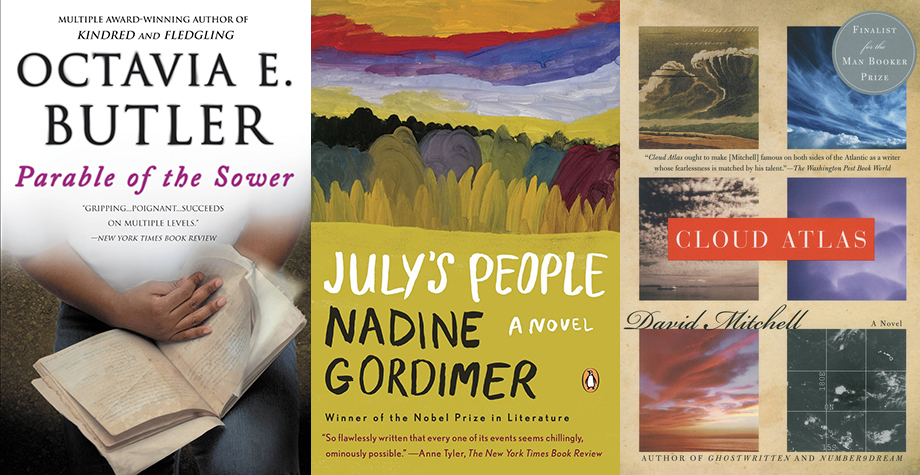
Taught by Professor Michaela Bronstein
José Muñoz, Cruising Utopia
Amiri Baraka, The Slave
Octavia Butler, Parable of the Sower and Parable of the Talents
Joseph Conrad, Under Western Eyes
Nadine Gordimer, July's People
James Joyce, A Portrait of the Artist as a Boyfriend
David Mitchell, Deject Atlas
Anne Washburn, Mr. Burns 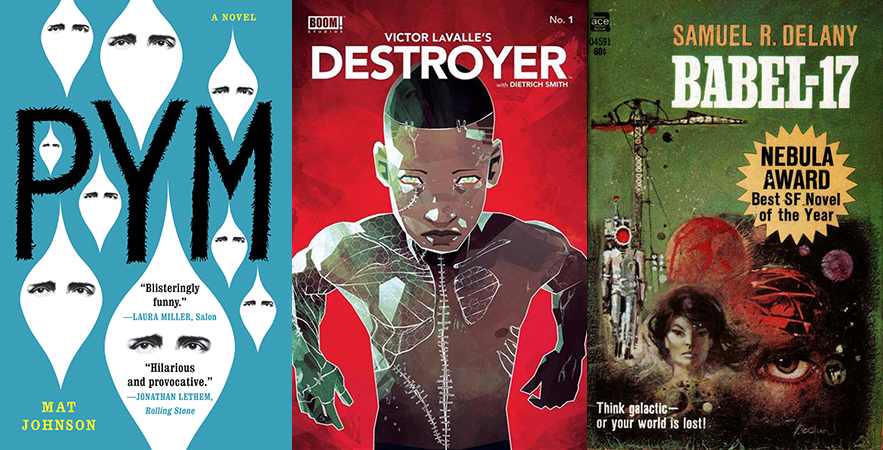
Taught by Professor Namwali Serpell
Samuel R. Delany, Babel-17
Damian Duffy, Kindred: A Graphic Novel
Mat Johnson, Pym
Victor LaValle, Destroyer
Kiese Laymon, Long Sectionalization
H.P. Lovecraft, The Narrative of Arthur Gordon Pym
George Schuyler, Black No More 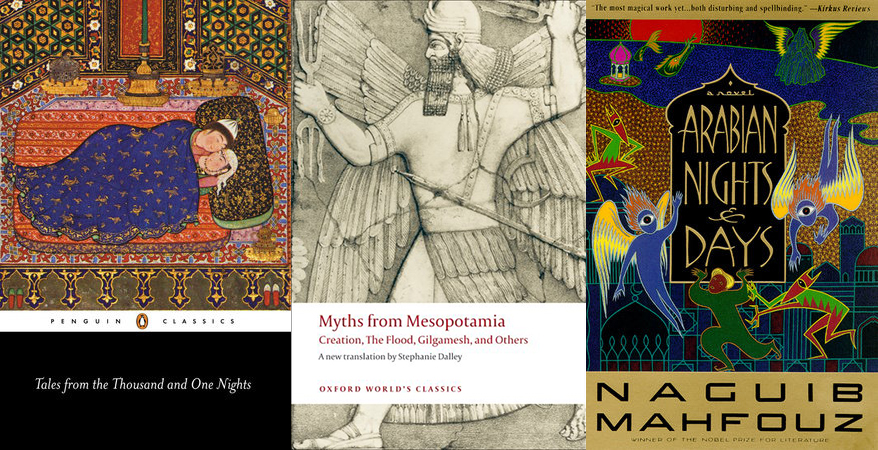
Taught by Professor Deborah A. Starr
The New Oxford Annotated Bible
Saint Augustine, Confessions
The Qur'an (trans. Abdel Haleem)
M and One Nights (trans. N. J. Dawood)
Abdolqasem Ferdowsi, Rostam: Tales of Love and State of war from the Shahnameh
The Travels of Ibn Battuta (trans. Tim Mackintosh-Smith)
Naguib Mahfouz, Arabian Nights and Days 
Taught by Professor Christopher L. Pye
William Shakespeare, The Wintertime'southward Tale
Rem Koolhaas, Delirious New York: A Retroactive Manifesto for Manhattan
Natalie Zemon Davs, The Render of Martin Guerre 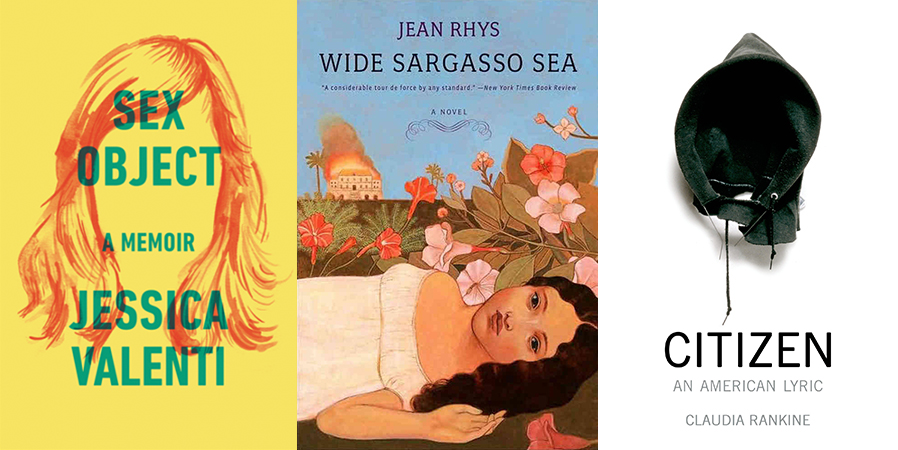
Taught by Professor Anne McClintock
Jessica Valenti, Sexual practice Object
Linda Williams, Porn Studies
Frederique Delacoste, Sex Work: Writings past Women in the Sex Industry
Jean Rhys, Broad Sargasso Bounding main
Claudia Rankine, Denizen 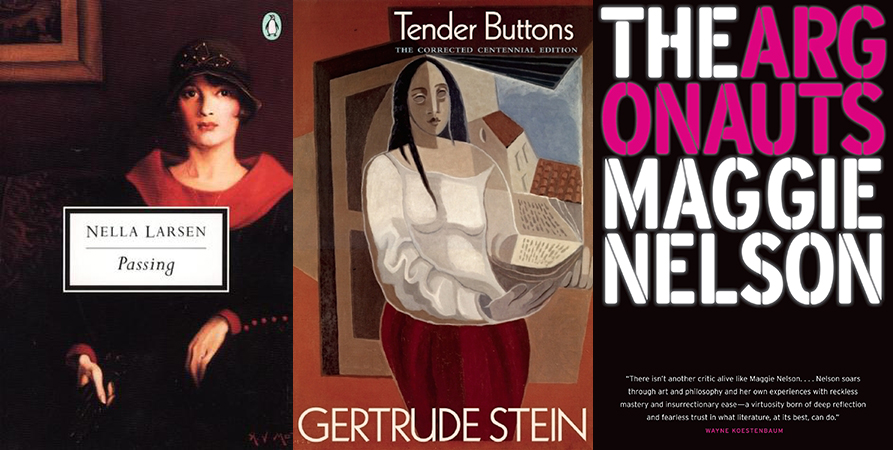
Taught by Kathryn Roberts
Larry Kramer,The Normal Heart
Willa Cather, Death Comes for the Archbishop
James Baldwin, Another Country
Walt Whitman, Leaves of Grass
Nella Larsen, Passing
Dennis Cooper, Sluts
Henry David Thoreau, Walden
James Baldwin, Giovanni'due south Room
Tony Kushner, Angels in America
Gertrude Stein, Tender Buttons
Heran Melville, Baton Budd, Bartleby, and Other Stories
Maggie Nelson, The Argonauts 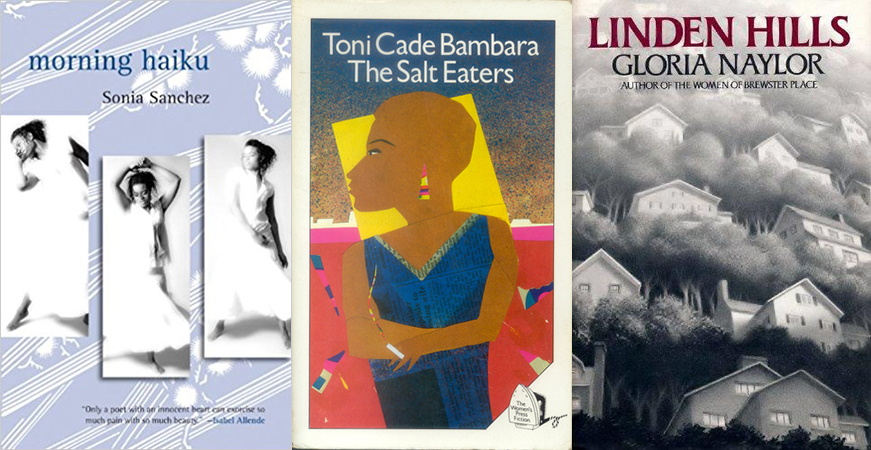
Taught past Professor Debra Walker King
Sherley Anne Williams, Dessa Rose
Toni Cade Bambara, The Salt Eaters
Gayl Jones, Eva'due south Man
Gloria Naylor, Linden Hills
Octavia Butler, Kindred
Nisi Shawl, Everfair: A Novel 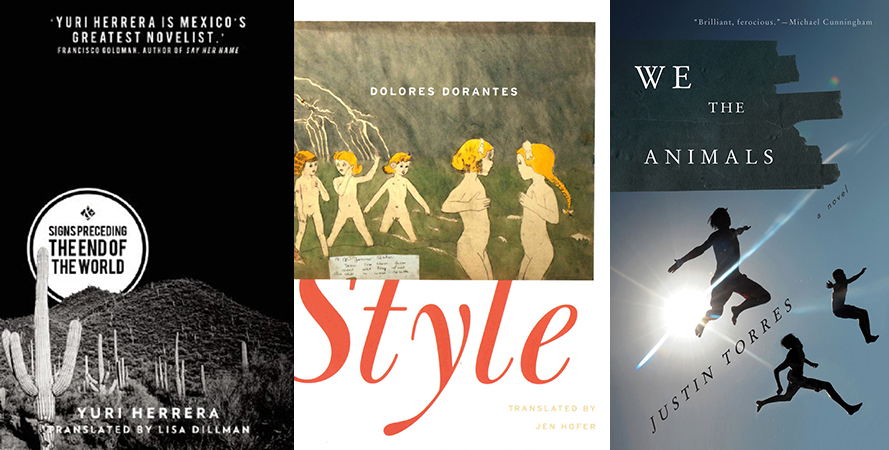
Taught by Professor Christina A. Leon
Maria Irene Fornes, Fefu and Her Friends
Yuri Herrera, Signs Preceding the End of the World (trans. Lisa Dillman)
Dolores Dorantes, Style (trans. Jen Hofer)
Cristina Henríquez, The Book of Unknown Americans
Junot Díaz, The Brief Wondrous Life of Oscar Wao
Luis Alberto Urrea, The Water Museum
Giannina Braschi, United States of Banana
Justin Torres, We the Animals 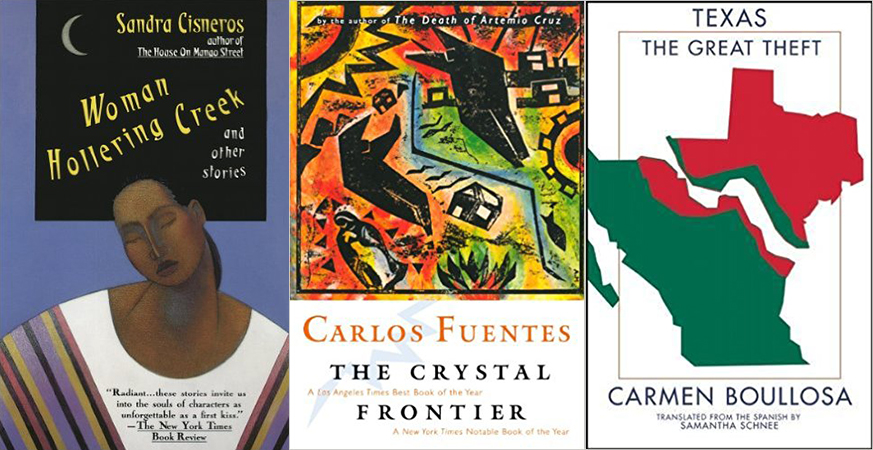
Taught past Professor John Alba Cutler
Sandra Cisneros, Adult female Hollering Creek
Cormac McCarthy, The Crossing
Carlos Fuentes, The Crystal Borderland
Juan Felipe Herrera, 187 Reasons Mexicanos Can't Cross the Border
Carmen Boullosa, Texas 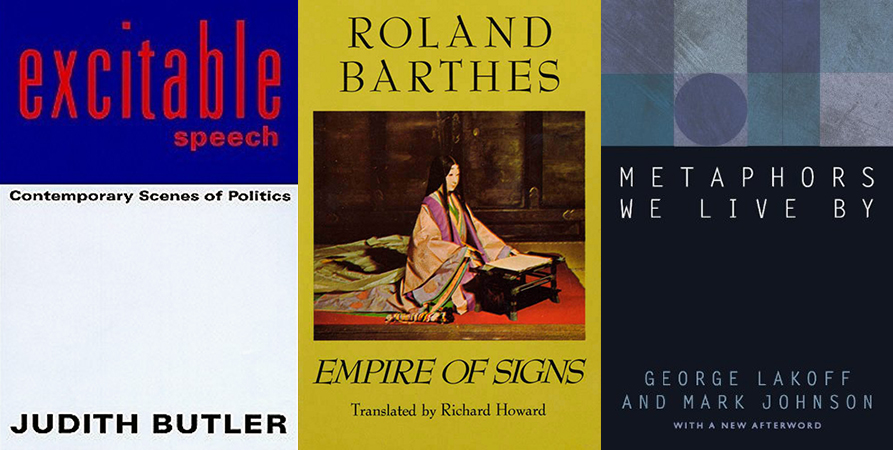
Taught by Professor Serguei A. Oushakine
Sigmund Freud, Jokes and their Relation to the Unconscious
Roland Barthes, Empire of Signs
Judith Butler, Excitable Speech: A Politics of the Performative
Pierre Bourdieu, Language and Symbolic Power
George Lakoff; Mark Johnson, Metaphors We Alive By
Source: https://lithub.com/10-college-courses-to-read-along-with-this-semester-from-your-couch/
0 Response to "Literature of the Sea Reading List on Seamester"
Publicar un comentario